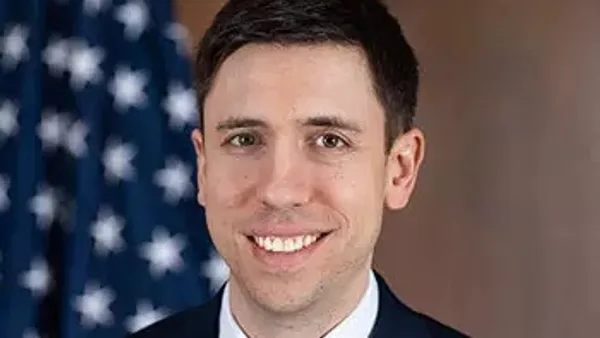Dive Brief:
- West Virginia said Thursday it would stop awarding new state business to JPMorgan Chase, Wells Fargo, Goldman Sachs, Morgan Stanley and asset manager BlackRock over the companies’ decisions to cut back on financing to coal companies.
- A state law passed this year gives West Virginia’s treasurer, Riley Moore, the authority to create a list of restricted financial institutions. Moore warned the five companies — and U.S. Bank — last month they would be placed on the list in 45 days if they could provide proof that they weren’t “boycotting” fossil fuels. The companies all disputed the notion of a boycott, and some noted they face criticism from activists who assert they do too little to fight climate change.
- U.S. Bank avoided being put on the list, Moore said, because it eliminated policies against financing coal production. A bank spokesperson said it was pleased to not be excluded from the state, but that its policies were in place before West Virginia passed its law.
Dive Insight:
West Virginia’s action comes as Republican lawmakers in a dozen states have advanced bills promising similar powers. Texas, for example, has passed laws blocking banks from doing business with the state if it determines they discriminate against energy companies or gun makers.
Florida Gov. Ron DeSantis on Wednesday proposed prohibiting financial companies that manage the state’s pension funds from considering environmental factors when making investment decisions.
Banks and other firms have long faced pressure to reduce their financial backing of carbon-intensive businesses, and many have gone public with their sharp reductions in coal financing.
In a statement seen by Reuters, Moore said the five finance firms were barred after a review of their policies and public statements found them to be "categorically limiting commercial relations with energy companies engaged in certain coal mining.”
JPMorgan called West Virginia’s decision “shortsighted and disconnected from the facts.”
“Our business practices are not in conflict with this anti-free market law,” the bank said Thursday in a statement seen by The Wall Street Journal.
JPMorgan is one of 25 designated depositories for the state, holding about $46 million, Moore said, according to The New York Times. The state intends to wind down those contracts by the end of the year and begin looking for service providers whose policies do not target the coal industry, Moore said.
“We’re handing money over to a financial institution that is generated from the fossil fuel industry,” Moore told the Times. “At the same time, they’re trying to diminish those funds. There’s a clear conflict of interest there.”
West Virginia is the nation’s second-leading coal-producing state, after Wyoming. The state collected $769 million in severance taxes from coal and other fossil fuel companies in fiscal 2021, according to the Times.
BlackRock, in a statement Thursday, said it “does not boycott energy companies” and does “not pursue divestment from sectors and industries as a policy.”
However, the company told clients in a 2020 letter that its managed funds would begin divesting from coal companies.
“Thermal coal is significantly carbon intensive, becoming less and less economically viable, and highly exposed to regulation because of its environmental impacts,” the letter read. “With the acceleration of the global energy transition, we do not believe that the long-term economic or investment rationale justifies continued investment in this sector.”
Moore pulled about $20 million of West Virginia’s operating funds out of BlackRock this year because he said the firm was excessively focused on environmental, social and governance (ESG) priorities, according to The New York Times.
Goldman Sachs did not immediately reply Thursday to requests for comment from the Times and Reuters.
In 2019, Goldman said it would commit $750 billion over the following decade toward projects that emphasize “climate transition and inclusive growth.” The bank last year turned down an opportunity “related to financing of a thermal coal mining company with no public diversification strategy,” it said in its 2021 sustainability report. But, Goldman noted in its submission to West Virginia, it also financed $17.8 billion in fossil fuels last year, according to a Rainforest Action Network (RAN) report.
Morgan Stanley cited its inclusion in the same report — as a member of what RAN calls “the ‘Dirty Dozen’ of top financiers of fossil fuels” — in its submission to the state.
The bank on Thursday said it was “disappointed” in West Virginia’s decision and that it “does not boycott fossil fuel energy companies.”
Wells Fargo said it “values its relationship with the state of West Virginia and our clients there and we disagree with this decision.”
Incidentally, West Virginia’s ban came hours after the state’s senior senator, Joe Manchin, announced a deal to expand federal support for renewable energy.
Regardless of the climate consequences from the burning of fossil fuels, Moore told The New York Times he sees it as his responsibility to protect West Virginians’ livelihoods.
“At what cost to human flourishing are we willing to inflict these types of restrictions as it relates to access to cheap and reliable electricity?” he said. “As West Virginians, our ability to be able to help power the nation with the natural resources that we have is a benefit not just to us, but to the entire country.”
Fossil-fuel finance is hardly the only contentious issue that has pushed government officials to reconsider their banking relationships. Commissioners in Pennsylvania’s Lehigh County voted this month to approve a plan to divest $145 million in assets from Wells Fargo over the bank’s donations to organizations that support anti-abortion politicians.
Republican lawmakers in the House and Senate this spring urged their chambers to end their contractual relationships with Citi, which in March pledged to cover travel expenses for employees seeking abortions.















